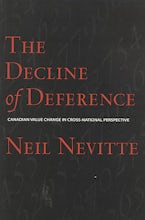Part I: Setting the Stage
Chapter One: A Decade of Turmoil
Interpreting Turmoil
Canada as One Stage
Three Perspectives on Canadian Value Change:
1. Canada as an Advanced Industrial State
2. Canada as a North American State
3. Canada as an Immigrant Society
Chapter Two: Setting the Stage
Structural Shifts in Context
From Structural Change to Value Change
Public Priorities and Orientations Towards Authority
Conclusions
Part II: Political Value Change
Chapter Three: A Changing Political Culture
Interest in Politics
Confidence in Governmental Institutions
Confidence in Non-Governemtnal Institutions
The Rise of Cosmopolitanism
Conclusions
Chapter Four: Changing Patterns of Political Participation
The Rise of Protest Behaviour
New Movements
The Case of Environmentalism
Civil Permissiveness
Orientations Towards Change
Challenging Public Authority
Conclusions
Part III: Economic Value Change
Chapter Five: Changing Economic Cultures
Support for the Free Market
Why do People Live in Need
When Jobs are Scarce
Free Markets and Free Trade: The Case of NAFTA
Conclusions
Chapter Six: A Changing Work Culture
The Work Ethic and Pride in Work
Why do People Work?
Elaborating Canadian-U.S. Comparisons
Workplace Participation
Conclusions
Part IV: Primary Relations
Chapter Seven: Moral Outlooks
Shifting Religious Orientations
Moral Permissiveness
Tolerance
Situation Tolerance
Conclusions
Chapter Eight: Family Values, Stability and Change
The Family and Marriage
Women and Men, Family and Work
Parents and Children
Connecting Authority Orientations: The Family, Work, and the Polity
Conclusions
Part V: Conclusions
Chapter Nine: Patterns of Change
Canada as an Advanced Industrial State: Perspective 1
Canada as a North American State: Perspective 2
Canada as an Immigrant Society: Perspective 3
Revisiting Authority Orientations
Authority Orientations and the Status Quo
Appendix: World Values Survey
Index

